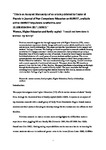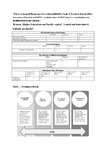Women, higher education and family capital: ‘i could not have done it without my family!’
| dc.contributor.author | Webber, LA | |
| dc.date.accessioned | 2017-11-16T12:44:23Z | |
| dc.date.issued | 2017-09-04 | |
| dc.identifier.issn | 1359-6748 | |
| dc.identifier.issn | 1747-5112 | |
| dc.identifier.uri | http://hdl.handle.net/10026.1/10165 | |
| dc.description.abstract |
Previous research suggests that through engagement with higher education (HE), mature female students experience identity change and transformation which could lead to conflict and strain on family relationships. This paper analyses the links between family support and students’ feelings of success. The findings are based on qualitative research methods focusing on whether HE changes a woman’s identity and reconstructs family relationships using a theoretical lens of family capital as a tool of analysis. A narrative line of inquiry was used to build detailed stories of a small group of female students and their partners. The 11 women students were selected from one foundation degree in an Early Years programme at a further education institution. Data was constructed using mind mapping, focused interviews and a mosaic approach of participant-led research. This paper shows that HE transforms women’s lives and the lives of their families. My paper contributes to knowledge on this topic through the development of a model of family capital. The paper concludes that through accessing family capital and having their studies valued by their family, women are able to minimise their feelings of guilt and be successful in their studies. | |
| dc.format.extent | 409-428 | |
| dc.language | en | |
| dc.language.iso | en | |
| dc.publisher | Taylor & Francis (Routledge) | |
| dc.subject | Mature women | |
| dc.subject | family capital | |
| dc.subject | higher education | |
| dc.subject | family relationships | |
| dc.subject | mothers | |
| dc.title | Women, higher education and family capital: ‘i could not have done it without my family!’ | |
| dc.type | journal-article | |
| dc.type | Article | |
| plymouth.issue | 3 | |
| plymouth.volume | 22 | |
| plymouth.publication-status | Published | |
| plymouth.journal | Research in Post-Compulsory Education | |
| dc.identifier.doi | 10.1080/13596748.2017.1358521 | |
| plymouth.organisational-group | /Plymouth | |
| plymouth.organisational-group | /Plymouth/Faculty of Arts, Humanities and Business | |
| plymouth.organisational-group | /Plymouth/Faculty of Arts, Humanities and Business/Plymouth Institute of Education | |
| plymouth.organisational-group | /Plymouth/REF 2021 Researchers by UoA | |
| plymouth.organisational-group | /Plymouth/REF 2021 Researchers by UoA/UoA23 Education | |
| plymouth.organisational-group | /Plymouth/Users by role | |
| plymouth.organisational-group | /Plymouth/Users by role/Academics | |
| dcterms.dateAccepted | 2017-04-24 | |
| dc.rights.embargodate | 2019-3-4 | |
| dc.identifier.eissn | 1747-5112 | |
| dc.rights.embargoperiod | Not known | |
| rioxxterms.versionofrecord | 10.1080/13596748.2017.1358521 | |
| rioxxterms.licenseref.uri | http://www.rioxx.net/licenses/all-rights-reserved | |
| rioxxterms.licenseref.startdate | 2017-09-04 | |
| rioxxterms.type | Journal Article/Review |



